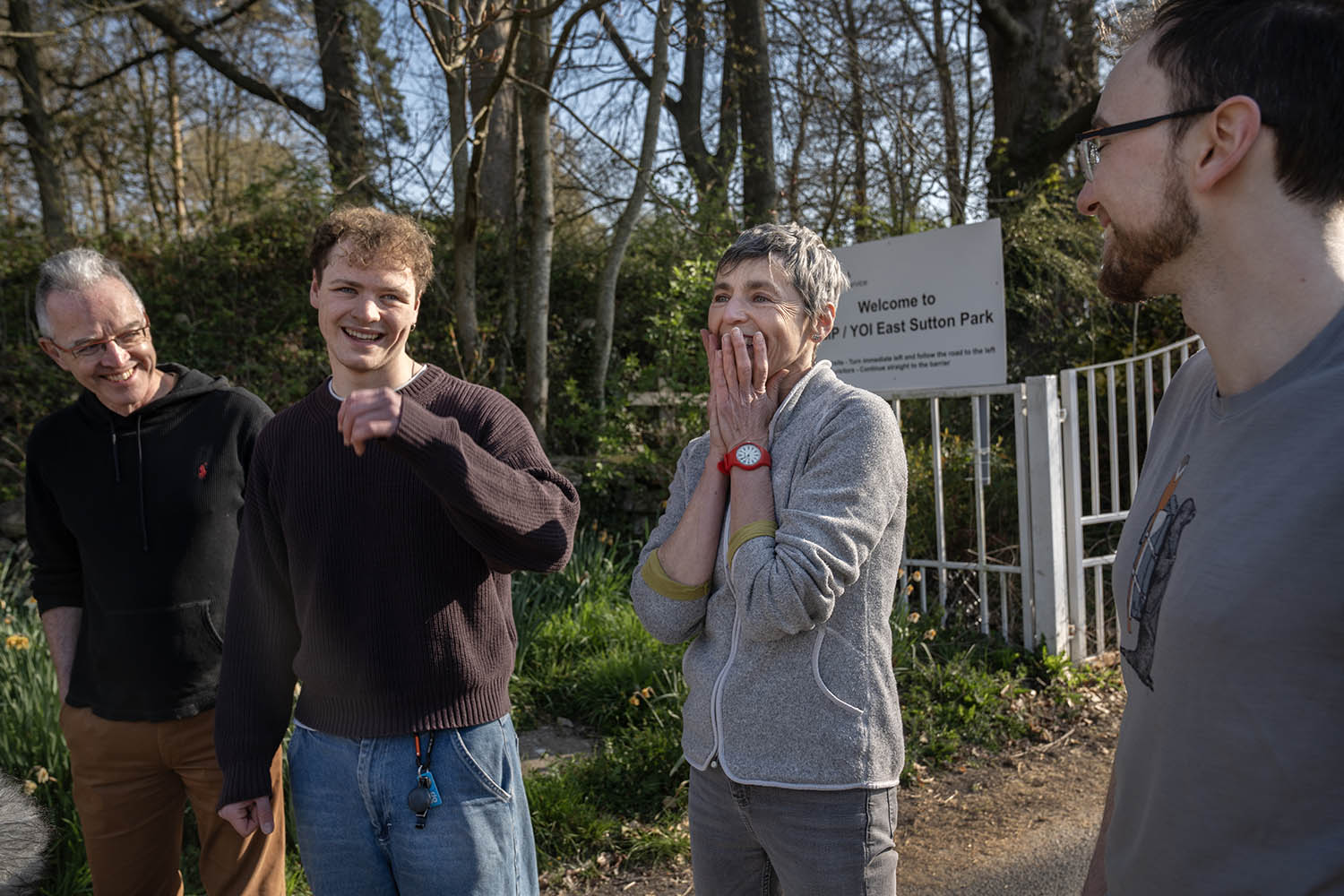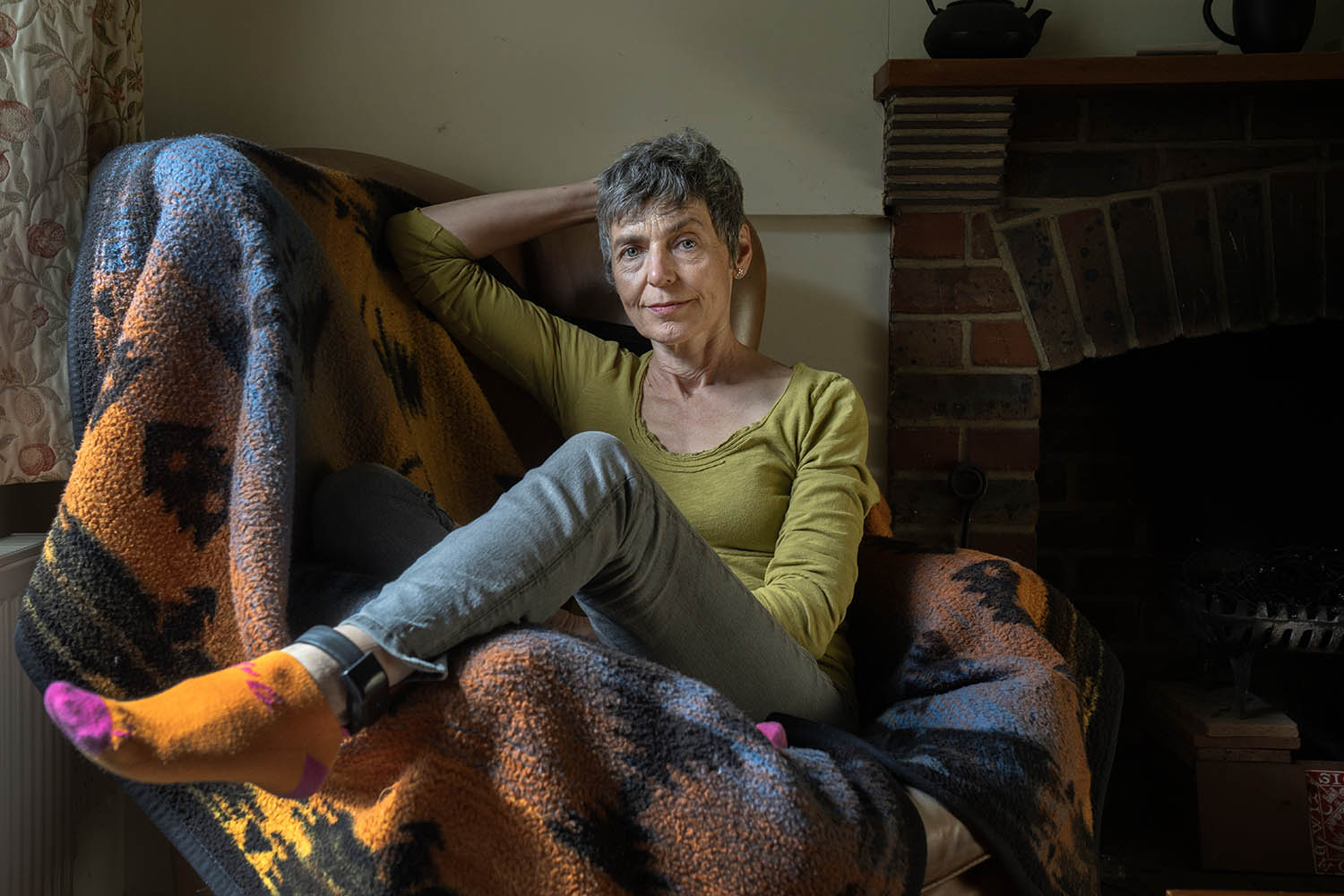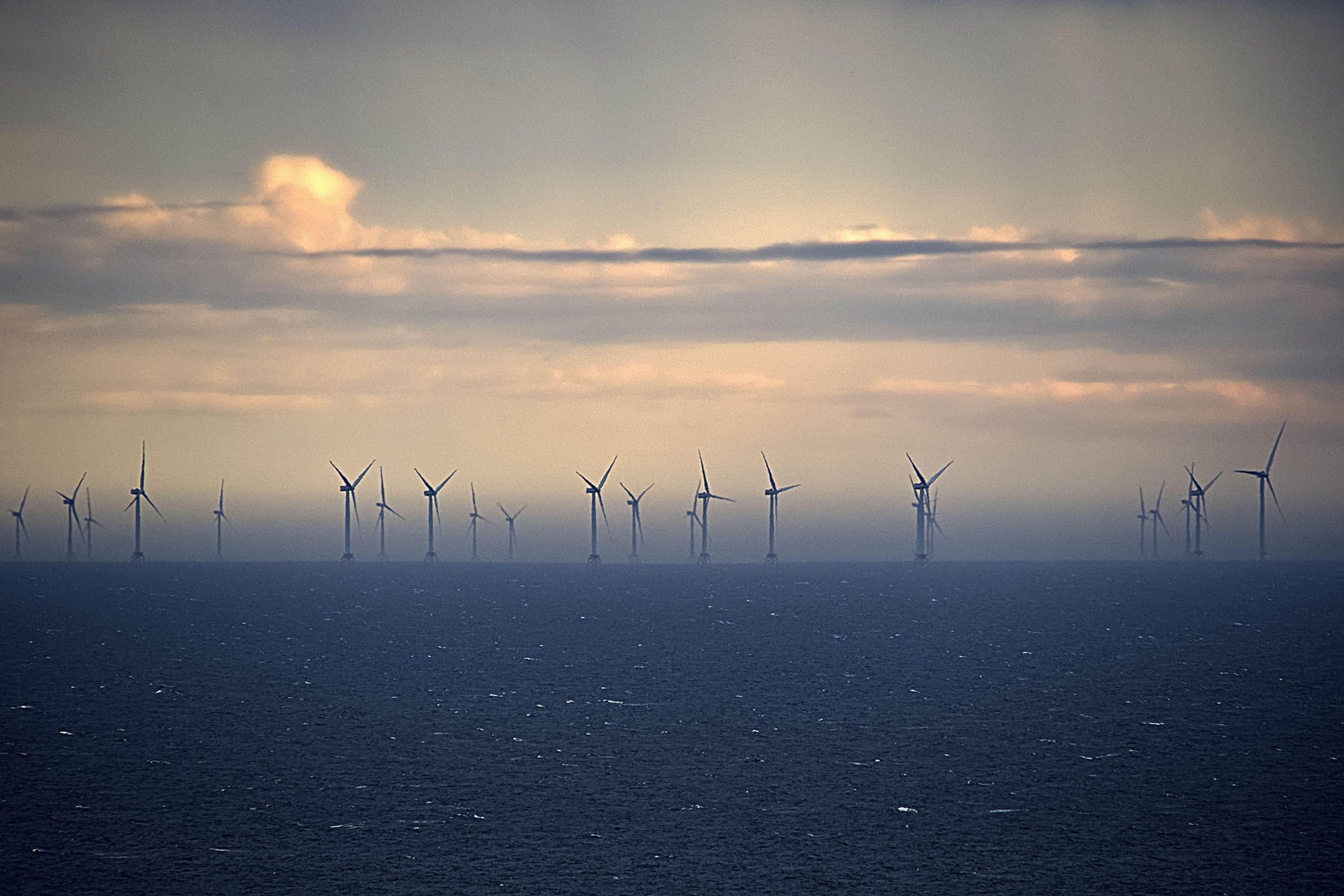Get Up, Stand Up is blaring out of somebody’s speakers when a few dozen people log in to the Zoom call.
It’s a Wednesday night in November 2022, and the usual mix of badly lit bedrooms and unflattering close-ups, except for a handful of people, with usernames like FlowerPower, keeping their cameras turned off.
For a solid month, climate activists from Just Stop Oil have been throwing soup, locking on, and spray-painting London landmarks. They’ve been hitting motorways and bridges, football matches and galleries, targeting Suella Braverman’s Home Office and Rupert Murdoch’s News Corp headquarters. The autumn of 2022 in Britain has been an orange-hued season of civil disobedience.
Bob Marley fades out and a man with long grey hair and glasses called Roger Hallam, a co-founder of Just Stop Oil, sets the scene for an operation to shut the M25 at multiple junctions all round London’s perimeter.
Lou Lancaster, a former special needs teacher in her 50s, talks about the time she climbed a motorway gantry and was up there for hours while police shut the road below and sent a specialist climbing team to bring her down. Hallam tells the group if the protest goes on for three or four days it will be the biggest disruption in British history and would force the government into action.
What he doesn’t know is that FlowerPower, listening with her camera off, is a journalist from The Sun – and she’s recording everything.
Just Stop Oil’s plans are about to set in motion the most severe judicial crackdown against non-violent protest that the UK has ever seen. Lancaster will get four years in prison, Hallam, a co-founder of Just Stop Oil, will be sentenced to five.
Climate protesters – “eco zealots” if you prefer the language of the Daily Mail – have enraged motorists, stretched police and prompted Conservative governments of Boris Johnson and Rishi Sunak to pass two laws with anti-protest measures to punish them.
Related articles:
Those laws have made it easier for police to shut down protests, and have led to more than 2,270 charges.
Judges have sent climate protesters to prison for using the C-word in their courtroom.
Newsletters
Choose the newsletters you want to receive
View more
For information about how The Observer protects your data, read our Privacy Policy
Backlogs in the courts are now so bad that some trials are taking more than five years to get in front of a jury.
Today Yesterday, as Just Stop Oil stages its final large-scale demonstration, in central London and promise s d to hang up the hi-viz, climate activists are hitting pause and taking time to reflect on where they go next.

An activist spreads orange powder as a sign of protest during the Premiership Final rugby union match. Photograph: Ben Stansall/AFP via Getty Images
A question hangs over the wake: who killed Just Stop Oil? There’s a long list of suspects, from politicians and the legal profession to the media and a frustrated public. It may be – like Agatha Christie’s Murder on the Orient Express – that everyone did it. But the question is worth asking because a movement that was once as important and influential as it was divisive threw in the towel this weekend, and it’s not clear what happens next.
Where is the tipping point when a cause becomes a crime? Maybe it depends upon how close you are to the action. It’s easy to admire suffragettes or civil rights protesters from the last century, or be stirred by democracy protesters half a world away. But if it’s your car caught in traffic? That hits differently.
Climate protest tactics have been alienating for many people who support the cause because they are designed to disrupt thousands of lives. Just Stop Oil’s organisers will tell you “we are not there to be liked. We are there to get press attention and to put pressure on the government”.
Despite the arrests, the M25 disruption went ahead and activists closed parts of the motorway for four days. Prosecutors claimed 708,523 vehicles were affected, the economic cost was put at about £760,000 and costs for the Metropolitan Police were more than £1m.
Lancaster’s trial judge channelled the indignation that rolled from traffic jams to rightwing newspapers and Conservative benches when he told the defendants, “you have taken it upon yourselves to decide that your fellow citizens must suffer disruption and harm … simply so that you may parade your views”.
Protest has never been a free-for-all, and civil disobedience could always end in court. But until very recently, punishment has been much less severe because courts acknowledge that protest is an extension of democratic voice.
The anti-protest laws that passed under the last Conservative government were based on a paper from the Policy Exchange rightwing thinktank authored by Richard Walton, a former Scotland Yard counter-terrorism police chief and Tom Wilson, an expert in security and extremism. The Observer contacted both for comment. They did not respond.

Lou Lancaster with her ex-husband Tim and sons Theo and Tristan after being released from HMP/YOI East Sutton Park in Kent on 8 April. Tom Pilston/The Observer
The Policy Exchange paper demanded more aggressive policing, tougher laws to restrict protest and prosecution of everyone law-breaking in relation to public protests.
Climate protesters point out that Policy Exchange has received funding in the past from ExxonMobil and see the potential hand of the fossil fuel industry influencing the pen on the anti-protest laws.
Rishi Sunak confirmed Policy Exchange “helped us draft” the anti-protest laws, which were brought forward by home secretaries Priti Patel and Suella Braverman with plenty of rhetoric about Britain’s long tradition of protest, but not much respect for it.
Climate protesters were extremists and a threat to our way of life, Braverman said, enemies of the “hard-working majority”, Sunak claimed.
Priti Patel’s Police, Crime, Sentencing and Courts Act 2022 increased penalties for obstructing highways and updated public nuisance laws with sentences of up to 10 years for offenders.
A lot of measures were stripped out by parliament, but revived by Braverman in the Public Order Act 2023. She gave police powers to halt protests that cause “more than minor” disruption, which put many more protesters at risk of charges.
Liberty, the human rights organisation, challenged her and won in the high court, which ruled that Braverman had acted without being given the power by parliament. (For full disclosure, I am a trustee of Liberty.)
Braverman appealed, but then Labour won the general election. To the surprise of many, Labour did not drop the appeal after Yvette Cooper took over at the Home Office.
The result of the appeal is expected imminently and will have a key impact on police behaviour, the scale of charges and prison sentences.
Raj Chada, a protest specialist lawyer, who acted in the M25 conspiracy case and defended one of the women jailed for throwing soup at Van Gogh’s Sunflowers, said he’d seen change both in the nature of protests and the response by the state.
The Extinction Rebellion occupation of Oxford Circus with a pink boat in 2019 was a key moment. Police didn’t intervene initially, then after a number of days there were thousands of arrests. Prosecutors selected about 30 cases to charge, but the Crown Prosecution Service suddenly decided to prosecute everybody. “You had grannies of 76, 77, never been in trouble before, turning up to court, pleading guilty and giving these eloquent speeches about the dangers of the climate crisis.”
They all got conditional discharges, the lowest penalty a court can offer.
“That seems like a lifetime ago, not six years ago,” Chada said.
There were further XR “rebellions”, what activists call more spicy actions – like blocking Rupert Murdoch’s print works to stop newspapers being distributed. “We got evidence disclosed that Priti Patel had been on the phone to the chief constable of Hertfordshire police saying, ‘You’re not moving quickly enough’ ... one of the phrases was ‘she’d been ringing constantly throughout the night’,” Chada said. “One of the themes in all of this is the interference by politicians in how protests are policed.”
Tactics were shifting. When Insulate Britain started sitting on motorways, prosecutors used public nuisance charges. Penalties were much more severe and prison was a real risk.
In some early cases, defendants were able to use a human rights defence that let them talk about the reasons why they were protesting. Juries who heard them were coming back with not guilty verdicts.
Soon some judges were preventing defendants from talking about climate change during the trial. Some defendants who refused to go along with that requirement were jailed for contempt of court.
Guilty verdicts increased – and charges under the new anti-protest laws meant people started going to prison for a long time. Lancaster was given a four-year sentence last summer for her part in the Zoom call M25 conspiracy.
Michael Forst, a UN special rapporteur who attended the trial, said the sentences were “not acceptable in a democracy”. More than 1,200 cultural figures – from the arts and human rights to religion and science – wrote to the new Labour government calling the sentences “insanity”.
Chada, the protest lawyer, said: “We can’t find any case in Europe where peaceful protesters have been imprisoned for anything more than a few days, and we are up to four years.”
The sentences were reduced by the court of appeal in Lancaster’s case because the judge had failed to take account of human rights law or conscientious motivation. Baroness Carr, the Lady Chief Justice, ruled that Lancaster’s sentence had been “manifestly excessive” and cut it to three years.
In opposition, Labour fought against anti-protest laws. In government, they have shown no eagerness to repeal the laws – promising only to accelerate reviews of how the legislation is working.
The Labour government has choices. It could repeal the anti-protest laws that have led to sentences longer than some sexual assault cases.
Akiko Hart, director of Liberty, said: “Any attempt to repeal these two pieces of legislation would require a significant change in political direction, and I’m not sure that politically that’s where we are right now.”
Instead of repealing the laws, there is another way the government could change how the justice system deals with protest. It could offer guidance to police, prosecutors and courts about how to interpret the law.
It could be modelled on guidance written in 2012 advising prosecutors “to balance the public’s rightful expectation that offenders should face justice, with our legally enshrined, and age-old tradition, of peaceful protest”.
That guidance was written by the then director of public prosecutions, Keir Starmer.
The Conservative government has gone, but until Labour takes a stand to defend the right to protest, some people believe we are still living in Braverman’s Britain.
So who did kill Just Stop Oil? People I’ve spoken to in the movement and the wider legal world left me with the view that the hammer of the state had simply flattened the organisation.
It always prided itself on being non-hierarchical, but co-founders and key strategists Roger Hallam and Indigo Rumbelow are both in prison, one serving four years, the other to be sentenced on similar charges next month.
In their absence, Just Stop Oil is reduced to a role providing support, care and publicity for the many activists still going through the courts.
Just Stop Oil says it wants time to reflect – there’s talk of citizens’ assemblies and building a mass movement extending to economic and social justice. Whatever that becomes, it does not sound like a route to press attention and pressure on the government.
What happens now for the climate protest movement and the activists?
Lou Lancaster got out of prison in April, after serving nine-and-a-half months. Sitting at home, wearing an electronic tag, she said she had no regrets about going to jail at 58. “When that sentence came, although it had a personal impact – it felt like a weight on me – I still was absolutely resolute in our need to do it and the benefit of doing that sentence.
“I’ve carried that with me through the sentence … it feels right to me to be doing this and I’m willing to make that sacrifice.”
She showed no bitterness towards the Sun reporter whose evidence was handed over to the police and got her locked up. “In a way, after all this has happened, probably that was a helpful play of hands by the universe – because I think what’s happened in the trial has raised a lot of awareness about injustice in our system.
“It didn’t stop the actions happening, and the trial that we were able to have because that journalist exposed things, actually has done a lot of good.”
The XR tattoo on the back of her neck and the tag around her left ankle are the visual clues as to her commitment to the cause, but she said she won’t return to civil disobedience before the formal end of her sentence in 2027.
One other veteran of climate protest offered a different perspective.
Sophie Cowen, a former advertising executive in her 30s, was one of seven women given suspended prison sentences in 2023 for using a pink hammer to smash a window at the Barclays Bank headquarters in London’s Canary Wharf.
She was in at the start of Extinction Rebellion and Insulate Britain, getting publicity for the actions. After her own conviction, she said: “I couldn’t personally keep pushing because I was physically and emotionally exhausted.”
She set up a charity called Switch It Green that helped 30,000 people move bank accounts away from institutions supporting fossil fuels.
Now, with some pioneers of Extinction Rebellion, she is part of Absurd Intelligence, an organisation experimenting with events combining arts, media, climate and democracy. It wants to capture the spirit of the Oxford Circus protest, changing conversations and getting people to think differently.
“I don’t align with Just Stop Oil,” says Cowen. “But I do believe that at the time of Extinction Rebellion and Insulate Britain and Just Stop Oil, it has been necessary to have what you might call a radical flank out in front in order to open up the space for other organisations to make change, sort of in the middle – to have conversations.”



